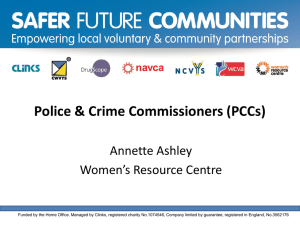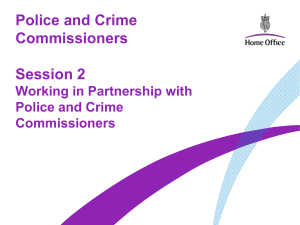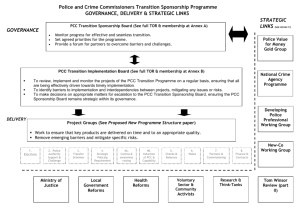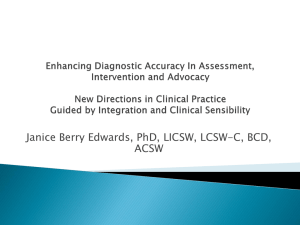Response to Home Affairs Committee consultation on
advertisement
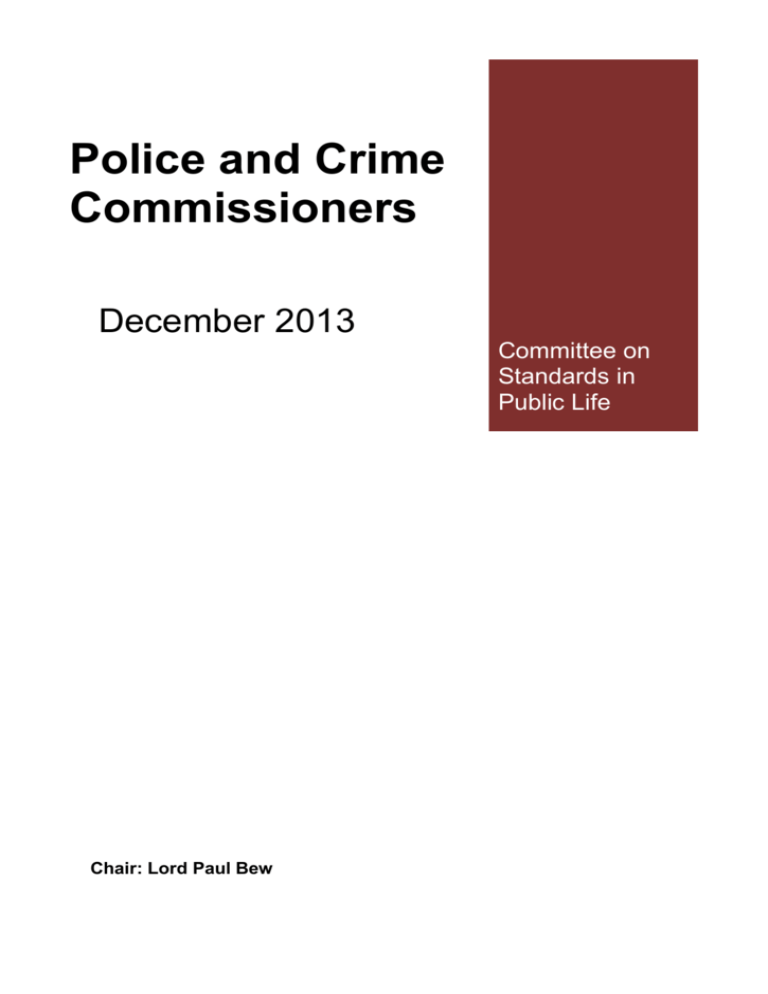
Police and Crime Commissioners December 2013 Committee on Standards in Public Life Chair: Lord Paul Bew RESPONSE FROM THE COMMITTEE ON STANDARDS IN PUBLIC LIFE TO THE CALL FOR EVIDENCE BY THE HOME AFFAIRS COMMITTEE ON POLICE AND CRIME COMMISSIONERS Introduction 1. The Committee on Standards in Public Life is an advisory Non-Departmental Public Body (NDPB). The Committee was established in October 1994, by the then Prime Minister, with the following terms of reference: “To examine current concerns about standards of conduct of all holders of public office, including arrangements relating to financial and commercial activities, and make recommendations as to any changes in present arrangements which might be required to ensure the highest standards of propriety in public life.” 2. The Committee on Standards in Public Life is defined by its Seven Principles of Standards in Public Life which are Selflessness, Objectivity, Integrity, Accountability, Openness, Honesty and Leadership. 3. The Committee’s terms of reference were updated in 2013 to include “anyone who works as a public officeholder. This includes all those who are elected or appointed to public office, nationally and locally, and all people appointed to work in the civil service, local government, the police, courts and probation services, NDPBs, and in the health, education, social and care services.” 1 4. For some time the Committee has been interested in the debate around the application of the Seven Principles of Public Life to policing2. We made clear our intention to monitor the extent to which Police and Crime Commissioners (PCC)s are genuinely open and accountable and how successfully any ethical risks arising from their role are addressed in our Annual Report,3 which said the Committee will keep a watching brief on “Ethical standards in the police, including Police and Crime Commissioners.” The Committee has responded to the College of Policing’s draft code of ethics4 where the Committee welcomed the introduction of a code of ethics in principle and emphasised the importance of properly embedding a code of ethics into an organisation. As part of our work plan, the Committee has met with Police and Crime Commissioners to discuss how it can best assist them in pre-empting any ethical risks they may face in their new roles, although the Committee is keeping open the possibility of conducting an inquiry if it is warranted. The Committee 1 http://www.public-standards.gov.uk/wp-content/uploads/2012/11/Annual-plan-13-14.pdf 2 The Committee notes the Stevens report and its recommendations. The report is available at: http://independentpolicecommission.org.uk/uploads/37d80308-be23-9684-054d-e4958bb9d518.pdf 3 http://www.public-standards.gov.uk/wp-content/uploads/2013/01/Standards_Matter.pdf 4 http://www.public-standards.gov.uk/our-work/other-reports-statements-and-publications/ therefore welcomes the opportunity to respond to the Home Affairs Committee call for evidence on Police and Crime Commissioners. The Committee’s response focuses on two questions: Ethical issues and risks around transparency and reporting The role of Commissioners in holding their chief constables to account and the relationship with the code of conduct; 5. Recent news stories, such as the “plebgate” incident, have contributed to the growing concern around standards in policing. Recent surveys have found that public trust in police is declining. In a poll conducted by YouGov, the number of respondents who trust senior police officers has decreased from 72% in 2003 to 49% in 20125. A quarter (26%) of those surveyed by ComRes in 2013 said the “plebgate” affair has made them less likely to trust the police.6 6. The role of Police and Crime Commissioner was introduced last year as part of a package of measures to improve accountability and standards in policing. Individuals are elected rather than appointed but have to be as politically impartial as any other public servant. Each PCC is responsible for holding their local police force to account and is directly accountable to the voters in their locality. PCCs are also accountable to Police and Crime Panels (PCPs), who have a veto over the appointment of chief constables and the setting of the precept (with a two thirds majority). As the Home Secretary recently said “the purpose of directly-elected police and crime commissioners was clear. They’d be elected, visible, well-known in their communities and accountable to the electorate.”7 In an assessment of progress, Lord Taylor of Holbeach said in a recent debate “Despite only being in post for a year, PCCs are already more visible than anonymous police authorities. Seven out of 10 members of the public are aware of PCCs.”8 7. The role of Police and Crime Commissioner is subject to legislation. The Policing Protocol Order 20119 “sets out how the new policing governance arrangements will work and clarifies the role and responsibilities of police and crime commissioners.”10 The Police Reform and Social Responsibility Act (PRSR) 201111 makes provision for the administration and governance of police forces and includes detailed requirements on PCCs. The Schedule to the Local Policing Bodies (Specified Information Order) 2011 (as amended in 2012) requires PCCs to publish “a statement of the policy of the elected local policing body in relation to the conduct of 4http://cdn.yougov.com/cumulus_uploads/document/syrhatyofp/Trust_trends_Nov_2012.pdf 6http://www.comres.co.uk/poll/1021/bbc-news-public-trust-in-the-police.htm 7 https://www.gov.uk/government/speeches/police-and-crime-commissioners-one-year-on-warts-and-all HL Deb, 28 November 2013, c1597 9 https://www.gov.uk/government/uploads/system/uploads/attachment_data/file/117474/policing-protocol-order.pdf 10 https://www.gov.uk/government/publications/policing-protocol-order-2011-statutory-instrument 11 http://www.legislation.gov.uk/ukpga/2011/13/pdfs/ukpga_20110013_en.pdf?view=interweave 8 relevant office holders, including procedures for the handling of qualifying complaints and conduct matters.”12 There is currently an obligation for PCCs to publish information under the following headings: Who they are and what they do What they spend and how they spend it What their priorities are and how they are doing How they make decisions What policies and procedures govern the operation of the office of the PCC Lists & registers 8. A culture of transparency should include being transparent about standards of behaviour of PCCs and their staff. The Committee believes that PCCs are facing ethical challenges in their new role as ethical leaders, particularly around: appointments; handling conflicts of interest; the procurement process; and decision making. 9. The PRSR Act allows PCCs to appoint a deputy PCC and other staff as thought appropriate. The Act states that appointment of staff of merit does not apply to the appointment of a deputy PCC. The Police and Crime Panel is required to make a recommendation to the PCC as to whether or not the candidate should be appointed after reviewing information on the criteria the PCC used to assess suitability and how those criteria were satisfied. The PCC may choose to accept or reject the recommendation of the Panel. The Committee considers appointments an area of risk for PCCs as they are not bound by principles of good practice for public appointments formulated by the Commissioner for Public Appointments. There have already been allegations and perceptions of cronyism, lack of accountability and misuse of money that it has been argued could instead have been spent on frontline policing services. Transparency is essential throughout the appointments process and as far as possible it should adhere to the principles and guidance set out by the Commissioner for Public Appointments. 10. The Committee defined integrity to mean public office holders “not placing themselves under any obligation to people or organisations that might try inappropriately to influence them in their work.”13 To satisfy this principle and avoid conflicts of interest, the Committee considers the retention of registers of 12 13 http://www.legislation.gov.uk/uksi/2011/3050/pdfs/uksi_20113050_en.pdf http://www.public-standards.gov.uk/wp-content/uploads/2013/01/Standards_Matter.pdf interests, details of membership of organisations, business interests and gifts and hospitality essential. The Committee agrees with the Home Affairs Committee report ‘Leadership and Standards in Police’ that said “Where hospitality is accepted, an up-to-date register should be kept by all police forces, with full details of those providing such hospitality, dates, and other relevant details. The register should at all times be in the public domain, including online, with additional entries being made immediately available.”14 11. In order to preserve high ethical standards and assure the public that decisions are being made fairly and free from influence, it is important that procurement and decision making is done in an open and transparent way. PCCs should also consider how lobbying activities may bring about conflicts of interest in respect of procurement and decision making. As we said in our lobbying report “At the heart of the concern is the confluence of money, influence and power and vested interests: it is often not known who is influencing decisions or what may have been done to achieve the influence.”15 A publicly available register of meetings held with external stakeholders could increase transparency and openness around these issues. As we recommended in our lobbying report “Public bodies should routinely publish information about all significant meetings and hospitality involving external attempts to influence a public policy decision.” 12. The Committee believes the ethical risks identified above are best dealt with by the introduction of a code of conduct which would provide the public with a common understanding of expected standards for PCCs. The code should be based on the Seven Principles, adaptable to local needs, have clear links to any existing and new codes of conduct and be published. However, it is not only important to introduce a code of ethics but also to implement it in such as way as to embed high ethical standards into the culture of the police force and its day to day processes. PCCs need to hold chief constables to account in this area in a meaningful and systematic way, recognising that recent evidence shows there is much to be done before the high standards in public life to which we all aspire are fully internalised in the cultures of all our public institutions.16 12. The Police Reform and Social Responsibility Act 2011 and the Elected Local Policing Bodies (Specified Information) Order 2011 legally require PCCs to publish information such as a register of interest. A Home Affairs Committee report entitled ‘Police and Crime Commissioners: Register of Interests’ noted that: “A number of PCCs have so far failed to publish the required financial information, or disclose the details of their own interests and allowances. The Home Office must monitor compliance with legal responsibilities to publish information and publish a list of non-compliant PCCs.”17 The Committee agrees with the recommendation of 14 http://www.publications.parliament.uk/pa/cm201314/cmselect/cmhaff/67/67i.pdf http://www.public-standards.gov.uk/wp-content/uploads/2013/11/2901376_LobbyingStandards_WEB.pdf 16 See the letter to the Prime Minister in Standards Matter for more details. Available at: http://www.public-standards.gov.uk/wpcontent/uploads/2013/01/Standards_Matter.pdf 17 http://www.publications.parliament.uk/pa/cm201314/cmselect/cmhaff/69/69.pdf 15 the Home Affairs Committee and notes that codes and standards are only effective if they are embedded into the culture of an organisation and its everyday business. The role of Commissioners in holding their chief constables to account 13. The Committee believes that as well as fulfilling their obligations locally, it is also important for PCCs to consider their responsibilities to national policing beyond their local commitments. Part of this includes being held to account by the Police and Crime Panel in accordance with the requirements of a code of conduct, as well as publishing information such as registers of interest. The Committee agrees with the Home Affairs Committee who wrote in their report ‘Police and Crime Commissioners: Register of Interests’ “We do not accept that a national register of PCCs’ interests is not necessary. There was unanimous agreement among the Police and Crime Commissioners we called for evidence that such a register would be a fair and helpful way to hold PCCs to account. If a national register is being compiled for chief constables, it makes clear sense to do the same for their elected counterparts”18. 14. The Home Secretary has said the picture of PCCs holding chief constables to account was “a little mixed.” 19 As we said in our response to the Public Administration Select Committee’s consultation on crime statistics “One of the main roles of a PCC is to open their police force to greater transparency. Just as important is for PCCs to be (and be seen to be) transparent and open. PCCs have a duty to engage regularly with the public and local communities. This means striving for ‘intelligent accountability’ which may be easier to talk about than to achieve, but implies: “building up a degree of trust over time that creates a virtuous feedback loop in which stakeholders can see policies being influenced and changed as a result of their input and being open, particularly in relation to reporting problems to avoid a culture of blame.”20 15. PCCs are ultimately held accountable at the ballot box and a PCC who has lost public trust and confidence may not be re-elected. Individual behaviour that falls below the standards the public expects could also affect the reputation of, and trust in, the police as a whole. The Public Attitudes Survey carried out on behalf of the Committee demonstrates that levels of trust are not static, trust can be lost and restored but it is a long and difficult process. As we said “public confidence has not yet returned to its 2004 level, let alone to the level reached in 2008, when only 18 per cent of the population held systematically sceptical views about those in public office.”21 18 http://www.publications.parliament.uk/pa/cm201314/cmselect/cmhaff/69/69.pdf https://www.gov.uk/government/speeches/home-secretary-college-of-policing-speech 20 http://www.public-standards.gov.uk/our-work/other-reports-statements-and-publications/ 21 http://www.public-standards.gov.uk/wp-content/uploads/2013/11/CSPL-survey-2012.pdf 19 Conclusion 16. The Committee welcomes the Government’s commitment to increase accountability in policing. The Committee believes that PCCs should be subject to their own code of ethics based on the Seven Principles that is applicable to their own experience. They must be clear about how they themselves are accountable in order to secure public confidence that they are fulfilling their role of holding chief constables to account. As highlighted in the Committee’s “Strengthening transparency around lobbying” report, increasing transparency leads to greater accountability22. Openness and transparency exposes and deters malpractice, improves accountability, encourages the highest standards of integrity and promotes public trust. PCCs need to promote and sustain these principles, leading by example, since as leaders of local policing bodies, they are critical to setting the culture of transparency and ethical behaviour in which the public can have trust across the criminal justice system in their area. 22 http://www.public-standards.gov.uk/wp-content/uploads/2013/11/2901376_LobbyingStandards_WEB.pdf The Committee on Standards in Public Life 1 Horse Guards Road London SW1A 2HQ Tel: 020 7271 2948 Internet: www.public-standards.org.uk Email: public@standards.gsi.gov.uk December 2013
